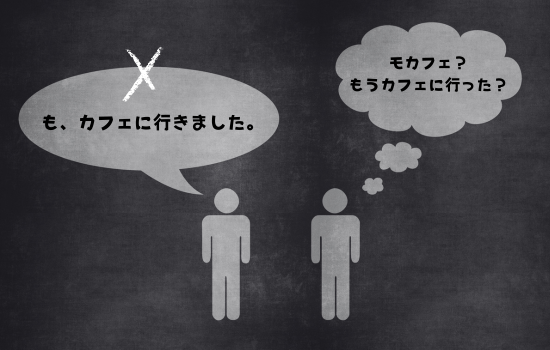A Common Mistake: Using the “も-particle” at the beginning of a sentence
A common mistake is trying to use the “も-particle” at the beginning of a sentence like the English word “Also.” Unlike “Also,” the “も-particle” is a postpositional particle that must always follow a noun or a noun phrase. It can’t stand alone at the beginning of a sentence. It functions to include the preceding noun in a group or list, similar to “too” or “as well.”
In Japanese, “Also” at the beginning of a sentence can be expressed using several conjunctions, each with its own nuance and appropriate context. The four common conjunctions are それに, あと, そして, and また. Here’s an overview of how to use each one, along with example sentences to illustrate their formality and typical usage situations.
それに (Sore ni)
Formality Level: Informal to friendly formal, commonly used in both spoken and written Japanese. Not suitable for formal writing or formal speeches.
- (カフェに行きたいな。)それに、本屋にも行きたい。
(カフェにいきたいな。)それに、ほんやにもいきたい。
— “(I want to go to a café.) Also, I want to go to a bookstore.” - (新しい設備が必要です。)それに、お金も必要です。
(あたらしいせつびがひつようです。)それに、おかねもひつようです。
— “(We need new equipment.) Also, we need money.” - (彼は仕事がよくできる。)それに、とても優しい。
(かれはしごとがよくできる。)それに、とてもやさしい。
— “(He is good at his job.) Also, he is very kind.” - (この映画は感動的です。)それに、この役者はすばらしいです。
(このえいがはかんどうてきです。)それに、このやくしゃはすばらしいです。
— “(This movie is touching.) Also, the actors are wonderful.” - (今日は暖かいですね。)それに、天気も良くなりました。
(きょうはあたたかいですね。)それに、てんきもよくなりました。
— “(It’s warm today.) Also, the weather has improved.” - (このプロジェクトは予算を超えてしまいました。)それに、時間も足りません。
(このプロジェクトはよさんをこえてしまいました。)それに、じかんもたりません。
— “(This project has exceeded the budget.) Also, there’s not enough time.”
あと (Ato)
Formality Level: Informal to moderately formal. It can be used casually or formally in conversation. It is often used in business settings, but it is not suitable for formal writing or formal speeches.
- (牛乳を買ってきて。)あと、パンも買ってきて。
(ぎゅうにゅうをかってきて。)あと、パンもかってきて。
— “(Buy some milk.) Also, buy some bread.” - (熱が下がるまでよく休んで。)あと、薬も飲んでね。
(ねつがさがるまでよくやすんで。)あと、くすりものんでね。
— “(Rest well until your fever goes down.) Also, take your medicine.” - (アイスコーヒーをひとつ。)あと、チーズケーキもひとつ、お願いします。
(アイスコーヒーをひとつ。)あと、チーズケーキもひとつ、おねがいします。
— “(One iced coffee, please.) Also, one cheesecake.” - (土曜は買い物に行こう。)あと、映画も見よう。
(どようはかいものにいこう。)あと、えいがもみよう。
— “(Let’s go shopping on Saturday.) Also, let’s watch a movie.” - (じゃあ、皿洗いをお願い。)あと、テーブルも拭いてくれる?
(じゃあ、さらあらいをおねがい。)あと、テーブルもふいてくれる?
— “(Then, please do the dishes.) Also, could you wipe the table?” - (飛行機のチケットを取って。)あと、会議のキャンセルのメールをしておいて。
(ひこうきのチケットをとって。)あと、かいぎのキャンセルのメールをしておいて。
— “(Get the plane tickets.) Also, send an email to cancel the meeting.”
そして (Soshite)
Formality Level: Formal, often used in written Japanese, speeches, and more structured conversations.
- (朝は晴れていました。)そして、風もありませんでした。
(あさははれていました。)そして、かぜもありませんでした。
— “(It was sunny in the morning.) Also, there was no wind.” - (新しいiPhoneを買いました。)そして、新しいケースも買いました。
(あたらしいiPhoneをかいました。)そして、あたらしいケースもかいました。
— “(I bought a new iPhone.) Also, I bought a new case.” - (彼女は背が高いです。)そして、目が茶色くて黒い髪をしています。
(かのじょはせがたかいです。)そして、めがちゃいろくてくろいかみをしています。
— “(She is tall.) Also, she has brown eyes and black hair.” - (彼は私の同僚です。)そして、私の親友でもあります。
(かれはわたしのどうりょうです。)そして、わたしのしんゆうでもあります。
— “(He is my colleague.) Also, he is my best friend.” - (犯人は逮捕されました。)そして、犯人の妻も共犯の罪で逮捕されました。
(はんにんはたいほされました。)そして、はんにんのつまもきょうはんのつみでたいほされました。
— “(The suspect was arrested.) Also, the suspect’s wife was arrested for being an accomplice.” - (二酸化炭素の排出量を減らすことが重要です。)そして、再生可能エネルギーの導入も必要です。
(にさんかたんそのはいしゅつりょうをへらすことがじゅうようです。)そして、さいせいかのうエネルギーのどうにゅうもひつようです。
— “(Reducing carbon dioxide emissions is important.) Also, introducing renewable energy is necessary.”
Note: そして can also mean “And then” depending on the context.
また (Mata)
Formality Level: Very formal, often used in written Japanese, formal speeches, report and business contexts.
- (彼女は個人で金メダルを獲得した。)また、彼女はチームでも銀メダルを獲得した。
(かのじょはこじんできんメダルをかくとくした。)また、かのじょはチームでもぎんメダルをかくとくした。
— “(She won a gold medal individually.) Also, she won a silver medal with her team.” - (昨年、この作品は大ヒットした。)また、若者に大きな影響を与えた。
(さくねん、このさくひんはだいヒットした。)また、わかものにおおきなえいきょうをあたえた。
— “(Last year, this work was a big hit.) Also, it had a significant impact on young people.” - (新しいプロジェクトが始まります。)また、新しいメンバーが加わります。
(あたらしいプロジェクトがはじまります。)また、あたらしいメンバーがくわわります。
— “(A new project will start.) Also, a new member will join.” - (彼は人気の作家です。)また、投資家としても有名です。
(かれはにんきのさっかです。)また、とうしかとしてもゆうめいです。
— “(He is a popular author.) Also, he is famous as an investor.” - (将来YouTuberになりたいという子供が増えている。)また、公務員になりたいという子供も増えている。
(しょうらいYouTuberになりたいというこどもがふえている。)また、こうむいんになりたいというこどももふえている。
— “(The number of children who want to become YouTubers in the future is increasing.) Also, the number of children who want to become civil servants is increasing.” - (この10年ほどでスマホ依存は深刻な問題になった。)また、これによる集中力の低下も大きな問題である。
(この10ねんほどでスマホいぞんはしんこくなもんだいになった。)また、これによるしゅうちゅうりょくのていかもおおきなもんだいである。
— “(In the past ten years, smartphone addiction has become a serious issue.) Also, the decline in concentration due to this is a significant problem.”
Note : “‘また’ can also be an adverb meaning ‘again’, and it is frequently used in daily conversation in this sense. This ‘また’ often appears at the beginning of sentences as well. The ‘また’ that you commonly hear in everyday conversation is usually this adverb meaning ‘again’ rather than the conjunction meaning ‘Also’.”
These sentences demonstrate the use of “Also” at the beginning of sentences with それに, あと, そして, and また, along with their formality levels and situational contexts. This can help you choose the most appropriate word depending on the formality of the situation and the nuances you wish to convey.
